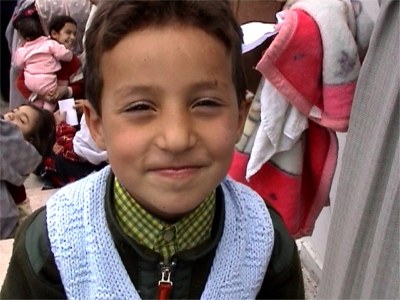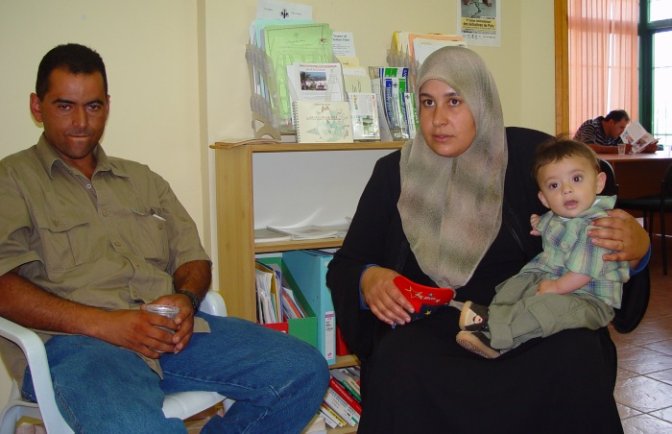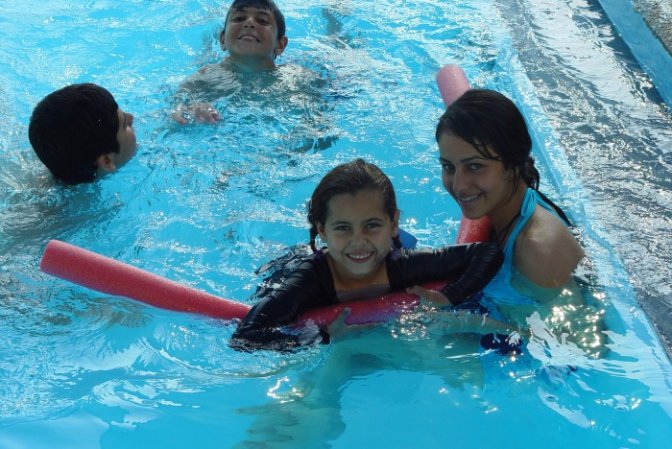Home > Oasis of Peace > Projects & Outreach > Humanitarian Aid > Summer update on Humanitarian Assistance
Summer update on Humanitarian Assistance
Tuesday 3 August 2004, by
All the versions of this article: [English] [italiano]

It has been a while since our last report, and we have some good news on a number of projects, which we want to share with you.
Helping Children who need medical care
Helping children who need special medical care that cannot be obtained in Palestinian hospitals has become a major part of our work. Every time we meet, each member of the committee comes with a pile of faxes that carry the appeals of parents who are desperate to help their children. It is only natural that we hear of the severe cases - others can receive medical treatment in Palestinian hospitals. We are coordinating our efforts with Dr. Assli of the French hospital in Nazareth, who is devoting much time to bringing Palestinian patients for treatment.
Amar Manasra is a six month old baby who lives with his four brothers and sisters in Beni Naim, near Hebron. Amar was born with a heart problem. We were approached by Dr. Assli, and together we managed to bring this baby for surgery at Schneider Hospital in Israel.
Apart from helping to cover the cost of surgery, we assisted the family in obtaining travel permits, so they could accompany their child to the hospital. On the admission day, NSWAS members Abdessalam Najjar and Dr. Abdallah Haj Yihye drove the anxious family to the hospital.
We are used to surprises when traveling through the checkpoints between Israel and Palestine. However, as much as we try to expect the unexpected, there is always something new. On this occasion, the permits were issued on time, and had been collected by Amar’s father Muhammad in advance. We had told him he should call us if there were any problems but, since no news is good news, on the morning of June 20, Abdessalam and Abdallah made the 45-minute drive to meet them in their village - a place that is light years away from here. When they arrived with the Palestinian family at the checkpoint, the soldier said that the mother could not pass: her permit was for the next day.
Muhammad had spotted the error in the permit, but thought that any soldier in his right mind would see it as an honest mistake and allow a mother, who is still breastfeeding, to accompany her child. The soldier said he had a “small head” (army slang for those who just do as they are told), and told them they would have to obtain a new permit from the nearest army base.
To obtain a new permit required a joint Jewish - Arab operation. I kept up pressure on the army over the telephone, Muhammad stood in line and, after an hour of frantic phone calls on one side and an anxious wait in the hot sun on the other, a new permit was issued. The officer there told Abdessalam and Abdallah that the whole exercise had been unnecessary, since in emergency cases like this, the soldier at the checkpoint can simply call through to obtain a permit by phone. When they eventually arrived back at the checkpoint, Abdessalam and Abdallah mentioned this trivial piece of information to the “small headed” soldier, who said, “I knew that - I just wanted them to rough it a little.”
The stay in the hospital went smoothly for everyone. All the staff were friendly and professional. Being received in the cardiology department by an Arab nurse helped them to feel “at home”. The operation was successful and after three days Amar was back home.
In April we took Malak Taiser, the Palestinian burns patient, for treatment at Tel Hashomer hospital, after a relapse in the condition of her leg necessitated minor surgery.
Since the treatment, she has continued with a regime of physiotherapy, and has progressed beautifully. Since weekly visits for the treatment at hospital entailed obtaining day-permits for her mother and arranging transportation, we decided to try a novel idea.
Among the parents of pupils at the NSWAS school are some professional physiotherapists. These volunteered to work with Malak here in the village. So, for the past several weeks, we have been bringing her to the village by herself, twice a week.
On each visit Sama Daoud, or another of the teenage girls in the village, takes her for a workout on her bicycle. This is followed by a session with a physiotherapist. Later, we usually take her for a swim at the pool. Each visit requires volunteers to drive back and forth between NSWAS and the checkpoint (a half hour journey in each direction), a physiotherapist, and lots of coordination. So far it has been working, and we hope to continue in this way through the summer. Malak is cooperative and very happy to come.
New connections in Khares village
A delegation from the HAP committee traveled to the West Bank village of Khares, at the invitation of Issa Suf. In May 2001, Issa was struck by a bullet that left him paralysed from the waste down during an army incursion into his village. Despite his disability, Issa is an activist well-known to peace groups. His story, including a personal letter to Israelis, was recently told in Haaretz newspaper (“I pity you for becoming murderers”) and earlier in 2001.
As a former sports instructor, Issa has an ambitious plan to establish a rehabilitation centre for disabled people, many of whom have been similarly crippled during the Intifada. Whereas such centres exist in some Palestinian cities, none are to be found in his area, with a result that the physical and psychological condition of disabled people there tends to worsen, while they remain a burden upon their families.
The purpose of the centre would be to help rehabilitate the patients physically and socially. HAP committee members Abdessalam Najjar and Dorit Shippin met with Issa to discuss the project and share ideas on how to raise money, and formulate a strategy for realising his goal.
While the group were in Khares, Dr. Abdallah Haj Yihya met with the father of a three year old girl who suffers from kidney failure and requires a transplant. Lina’s case is very complicated since Palestinian hospitals do not perform this operation, and she is ineligible for a transplant in Israel. Her age is also a problem, since not every hospital can perform the transplant of an adult kidney into a child. If a donor can be found, she may be able to receive the transplant at a hospital in Italy. In the meantime, Dr. Haj Yihya assisted the girl in obtaining dialysis treatment at Al Mukassad hospital in East Jerusalem.
Dr. Haj Yihya also met Ilham, a young woman with epilepsy, who was not responding well to the medicines prescribed for her condition. He brought her different medicines and advised her how to take better care of herself. The new medicines are helping and we have since delivered another package to her, which should tide her over the next few months.
Workshop planned for Palestinian and Israeli medical staffs
Thanks to a donation from the Australian charity Austcare, an encounter workshop is planned for Palestinian and Israeli medical staffs. The School for Peace will conduct the workshop in cooperation with the HAP. We are currently planning the encounter, which will include dialogue and in-service professional training.
Our Community
There are more than twenty people, both Jews and Arabs, young and old, helping with the various missions adopted by the HAP committee. As mentioned, the work even includes the larger community of parents at the school, since physiotherapists among them have volunteered to help with Malak’s treatment. We are also thankful for the full and generous cooperation of the staffs of the NSWAS guesthouse and swimming pool.
This work is often frustrating and discouraging, but the readiness of so many people to help, our ability to agree together on our mission, and the fact that the work is conducted voluntarily, continue to give us strength.





